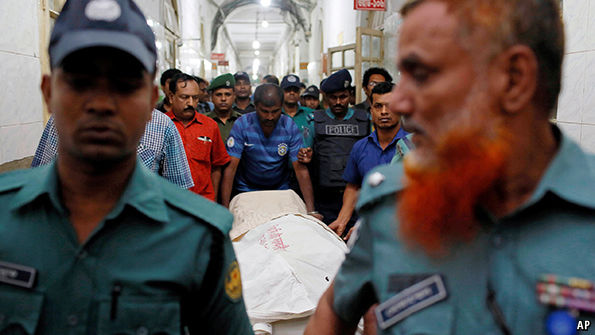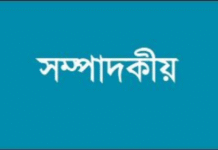A series of murders puts writers and bloggers on edge
IN BANGLADESH, the killing in broad daylight of progressive, secular members of the intelligentsia has become almost routine. On October 31st, assailants burst into an office in the capital, Dhaka, armed with machetes and hacked to death Faisal Arefin Deepan, a publisher. On the same day, another publisher was critically injured, as were two other writers present.
Ansarullah Bangla Team, sometimes known as Ansar al-Islam, a banned group inspired by al-Qaeda, has claimed responsibility for this and most other killings of secular thinkers in Bangladesh. It has published a “hit list” of those deemed to be critics of Islam and vowed that “no one who supports atheists will be spared”.
Ever since partition in 1947, when it was known as East Pakistan, Bangladeshi politics has had a radical Islamist fringe. But, as during its war of independence from Pakistan in 1971, the fringe is growing in strength. The ruling Awami League (AL) remains the country’s only mainstream secular force, but the obsession of its leader, Sheikh Hasina, the prime minister, with destroying the opposition alliance—made up of the Bangladesh Nationalist Party (BNP), led by her nemesis, Khaleda Zia, and the BNP’s Islamist ally, Jamaat-e-Islami, the largest Islamist party—is weakening Bangladesh’s secular, tolerant traditions.
Sheikh Hasina has rejected claims that the Islamist fringe is linking up with international terrorist groups such as Islamic State (IS). Instead, her party has accused the BNP and Jamaat of being behind the recent killings.
Yet the AL appears to be emboldening some Islamist radicals, too. Critics say its crackdown on opposition politicians and other opponents is pushing some towards more extremist groups. And in trying to avoid being seen as unpious—which could spark demonstrations against the government by the devout—the AL is appeasing Islamist conservatives by caving in to pressure not to pass secular laws. It is also selectively using defamation laws only to target critics of itself and of Islam.
The latest machete attacks came only weeks after two foreigners—an Italian aid worker and a Japanese farmer—were shot dead, in attacks claimed (on Twitter) by IS. Dhaka’s diplomatic area has been turned into a high security-zone. The murder of foreigners may be unrelated to the killings of secular publishers, but shoddy, politicised policing means that neither locals nor foreigners trust the authorities. The Italian was killed just as Australia pondered whether the country was safe for its cricket team to tour, and his death was an important factor in its decision to cancel the visit.
Other murders have added to a climate of fear. On October 24th two people were killed and scores injured in a bomb attack on Bangladesh’s small Shia community in old Dhaka—the only attack on the group in memory. Followers of Sufi Islam, a moderate branch, have come under attack. Writers, bloggers, as well as female journalists, some of whom appear on television unveiled, have also been threatened.
It could get worse. Sheikh Hasina has continued to pursue war crimes trials, aimed at settling scores from the struggle for independence. Top leaders of Jamaat have been sentenced by a self-styled International Crimes Tribunal (ICT) and two senior Islamists are now being prepared for execution.
Ali Ahsan Mohammad Mojaheed, the secretary general of Jamaat-e-Islami, was sentenced to death for crimes, including murder, committed by a pro-Pakistani paramilitary group for which the prosecution said he was responsible. Salauddin Quader Chowdhury is a wealthy former adviser of Mrs Zia who has close links to Pakistan. At his trial he mocked and interrupted the judges as they sentenced him. On November 17th the ICT is due to review an appeal by the two men. If it upholds their death sentences, they may be executed by the end of the year, an act that could lead to unrest in cities across the country.
Amid all the fear, the battling begums continue to trade insults. On a long visit to London, Mrs Zia recently referred to Sheikh Hasina as “Lady Hitler”. Of the four pillars of the 1972 constitution—nationalism, socialism, democracy and secularism—the last three appear to be collapsing or threatened. Under the Awami League’s control, Bangladesh is moving further and further away from the country imagined at independence.
Source: Economist










